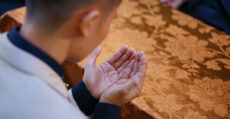Reference: al-Bid’u wal-Muhdathaat wa maa laa Asla lahu – Page 311
Noorun ‘alad-Darb Fataawa Fadheelatush-Shaykh Saalih Ibn Fowzaan – Volume 1, Page 92
Question: In your opinion, what is the Sharee’ah ruling in gathering people to read the Book of Allaah with the intention that the benefit of the recitation returns to the one who initiated the gathering or someone who is deceased?
Response: Certainly, reciting the Qur.aan is amongst the best means of attaining nearness [to Allaah]. Allaah (Jalla wa ‘Alaa) has commanded the recitation of His Book and acting according to it and contemplating it’s meanings. As for adopting a specific manner for the recitation, then this requires [appropriate] evidence.
Similar to what the questioner has mentioned by gathering the people to read the Qur.aan to attain its benefit, gifts or reward to the deceased, [then] there is no evidence for this in this manner, rather, it is an innovation. And from one angle, every innovation is misguidance and from another angle, if the reciters were reciting for money as in the case with many from amongst them, then there is no reward for this as they did not recite the Qur.aan for the Sake of Allaah (‘Azza wa Jall), rather, the recitation was for money.
If acts of worship are done for money then there is no reward for that as the intention of the person in doing this act is to seek worldly gain and this is from that which nullifies an act. However, the reciting of the Qur.aan benefits if the intention of the reciter or the listener for doing so is to seek nearness to Allaah and that it is done in an Islaamically legislated manner and not an innovated manner from which the ignorant have devised and innovated. So, similar to this recitation, its manner and gifting its reward to the deceased or the living is an innovation and there is no reward in this.
It is obligatory upon the Muslim to leave such acts and if he wants to benefit the deceased, then certainly he can benefit them with that which is mentioned with evidence from mercy and seeking forgiveness for them, praying for them and giving in charity, and performing the Hajj or the ‘Umrah on behalf of the deceased.
These issues are that with which there is evidence for benefiting the deceased and the living Muslims and as for doing an act for which there is no evidence, then this is regarded as an innovation, contrary [to the truth].





